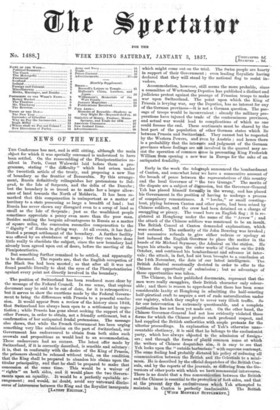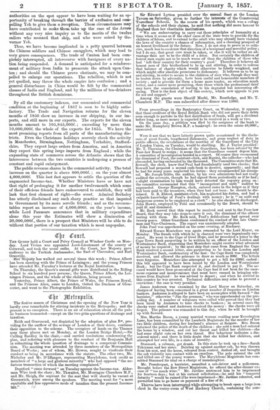NEWS OF THE WEEK.
THE Conference has met, and is still sitting, although the main object for which it was specially convened is understood to have been settled. On the reassembling of the Plenipotentiaries resident in Paris, Count Walewski laid before them a programme, stating "the difficulty" which had arisen under the twentieth article of the treaty, and proposing a new line of boundary as the frontier of Bessarabia. By this arrangement, Russia definitively relinquishes her pretensions to Bolgrad, to the Isle of Serpents, and the delta of the Danube ; but the boundary is so traced as to make her a larger allowance of land towards the North of Moldavia. It has been remarked that this compensation is unimportant as a matter of territory to a state possessing so large a breadth of land ; but Russia has never shown any disregard even to a scrap of land so small as the Isle of Serpents ; just as the wealthiest people sometimes appreciate a penny even more than the poor man. Besides making the bargain advantageous to Russia as a matter of square miles, the concession reconciles compensation to the " dignity " of Russia in giving way. At all events, it has facilitated a prompt settlement of the boundary. A. further facility was offered by an abundance of maps ; but they can have done little really to elucidate the subject, since the new boundary had already been agreed upon out of doors, before the meeting of the Plenipotentiaries.
But something further remained to be settled, and apparently to be discussed. The reports are, that the English occupation of the Black Sea had been mooted ; so that after all it was not found possible literally to shut the eyes of the Plenipotentiaries against every point not directly involved in the boundary.
• The position of Switzerland has been rendered more clear by the message of the Federal Council. In one sense, that copious document may be said to be out of date, for it is retrospective ; but it serves to show the exertions made by the Federal Government to bring the differences with Prussia to a peaceful conclusion. It would appear from a review of the history since 1848, that Switzerland has always been open to a settlement by negotiation; while Prussia has gone about seeking the support of the other Powers, in order to obtain, not a friendly settlement, but a confirmation of her antiquated feudal pretensions. The message also shows, that while the French Government has been urging something very like submission on the part of Switzerland, our Government has endeavoured to obtain from both sides such avowals and propositions as would lead to an accommodation. These endeavours had no success. The latest offer made by Switzerland, if it is correctly described, is sensible and salutary : it is, that in conformity with the desire of the King of Prussia, the prisoners should be released without trial, on the condition that the King shall be prepared to abandon his claims upon the titular principality, and that he shall be prepared to make that concession at the same time. This would be a waiver of "rights" on both sides, and it would place the two Governments upon an equality. It would be a perfectly equitable arrangement; and would, no doubt, avoid any mrtoward sures of intercourse between the King and the Royalist insurgents [LATEST EDITION.] which might come out on the trial. The Swiss people are hearty in support of their Government ; even leading Royalists having declared that they will stand by the national flag to resist invaders.
Accommodation, however, still seems the more probable, since a committee of Wurtemberg Deputies has published a distinct and. judicious protest against the passage of Prussian troops to make war upon Switzerland. The point upon which the King of Prussia is levying war, say the Deputies, has no interest for any of the German provinces—it is not a German question. The passage of troops would be inconvenient : already the military preparations have injured the trade of the conterminous provinces, and actual war would lead to complications of which no one could foresee the end. These sentiments must be shared by the best part of the population of other German states which lie between Prussia and Switzerland. They cannot but be respected by the Western Powers, and even by Austria ; and hence there is a probability that the interests and judgment of the German provinces whose feelings are not involved in the quarrel may assist the operation of common sense in preventing King Frederick William from opening a new war in Europe for the sake of an antiquated feudality.
Early in the week the telegraph announced the bombardment of Canton, and somewhat later we have a consecutive account of the breach of peace between the representatives of this country and the local Governor of " the two Quangs." The merits of the dispute are a subject of discussion, but the Governor-General Yeh has placed himself formally in the wrong, and has placed his Government in the position of having to undergo a process of compulsory remonstrance. A " lorcha," or small coastingboat, plying between Canton and other ports, had been seized by Chinese soldiers, and the crew had been detained on a charge of smuggling or piracy. The vessel bore an English flag ; it is registered at Hongkong under the name of the " Arrow " ; and the attack of the Chinese soldiers was construed to be an insult: The British Consul at Canton demanded explanations., whichwere refused. The authority of Sir John Bowring was invoked ; but successive refusals to ,give either redress or apology at last induced the English Governor to. place the matter in the hands of Sir Michael Seymour, the Admiral on'the station, He began his attacks upon the outer works of Canton on-the 24th October, and continued his boffibardment and advance at intervals ; the attack, in fact, had n'ot been brought to a conclusion at the 14th November, the date 'of our latest intelligende. The British Admiral occasionally desisted in order to offer to the Chinese the opportunity of submission ; but no advantage of those opportunities was taken.
The Chinese, in their published documents, represent that the men were really smugglers) their British character only colourable ; and there is reason to apprehend that there has beea some considerable laxity at Hongkong in admitting the half-coasting half-piratical craft to acquire a sort of zude naturalization under our registry, which they employ to cover very illicit traffic. So far our intervention is extremely questionable, and a complete, justification has not been yet made out. On the other hand, the Chinese Governor-General had not less evidently violated those forms for which the Chinese profeis such profound respect, and, had supplied the British authorities. with ample pretests for the ulterior proceedings. In explanation of Yeh's otherwise unitecountable obstinacy, it is said that he belongs to the exclusionist party, which has always objected to the admission of foreigners; and through the forms of placid common sense at which' the writers of Chinese despatches aim, it i.13 easy to see that Yeh looks upon the" outside barbarians-" with supreme contempt. The same feeling had probably dictated his policy of reducing all communication betweenthe British and the Celestials to a mini' mum. He is described by the official despatches of the British Con-: suls, and by the reports of the journals, as differing from the Governors of other ports with which we haVicommercial intercourse. There is no doubt that a free comraunicatien between the British' and the Chinese is essential to the protection Of both sides, and that at the present day the excluitiveness which Yeh attempted to maintain in Canton is perfectly inadmissible.. The British authorities on the spot appear to have been waiting for an opportunity of breaking through the barrier of exclusion and compelling Yeh to give them a reception. These circumstances may have contributed to make them take up the case of the Arrow without any very nice inquiry as to the merits of the twelve sailors who manned that ship, and who were seized by Governor Yeh.
Thus, we have become implicated in a petty quarrel between the Chinese soldiers and Chinese smugglers, which may lead to very grave consequences. The trade of Canton had been completely interrupted, all intercourse with foreigners of every nation being suspended. A demand is anticipated for a reinforcement of military from India to prosecute the attack upon Canton ; and should the Chinese prove obstinate, we may be compelled to enlarge our operations. The rebellion, which is not yet quelled, may throw the whole empire into confusion ; and a general disturbance in China would be felt by the commercial classes of India and England, and by the millions of tea-drinkers throughout the British dominions.
By all the customary indexes, our economical and commercial condition at the beginning of 1857 is seen to be highly satisfactory. The Trade and Navigation returns for the eleven months of 1856 show an increase in our shipping, in our imports, and still more in our exports. The exports for the eleven months amount to 105,845,0001.; exceeding by more than 10,000,000/. the whole of the exports for 1855. We have the most promising reports from all parts of the manufacturing districts. Even the Christmas holidays scarcely check the activity in Manchester, Birmingham, Nottingham, Yorkshire, Staffordshire. They expect large orders from America, and in America they expect this spring large imports from England ; while the expanding state of commerce across the Atlantic shows that the intercourse between the two countries is undergoing a process of constant and rapid enlargement.
The public revenue shares in the commercial activity. The total increase on the quarter is above 800,0001.; on the year almost 4,000,0001. This last fact appears to settle the question of the augmented Income-tax. Whether Ministers have or have net that right of prolonging it for another twelvemonth which some of their officious friends have endeavoured to establish, they will lack that first element of right—the want. Admiral Berkeley has utterly disclaimed any such sharp practice as that imputed to Government by its more servile friends ; and as the revenuetables report an increase of 4,000,000/. on the year's income, while Lord Panmure announces that in military expenditure alone this year the Estimates will show a diminution of 20,000,0001., there is a prospect that Ministers will be able to do without that portion of our taxation which is most unpopular.

































 Previous page
Previous page